|
|
|
Sort Order |
|
|
|
Items / Page
|
|
|
|
|
|
|
| Srl | Item |
| 1 |
ID:
167748
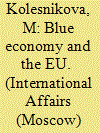

|
|
|
|
|
| Summary/Abstract |
THE UNITED NATIONS General Assembly Resolution "Transforming Our World: The 2030 Agenda for Sustainable Development," adopted on September 25, 2015, defined 17 Sustainable Development Goals (SDGs) and 169 targets. Achieving those objectives, which will be pursued by "all countries and interested stakeholders," should promote human prosperity and at the same time "secure the planet" [1]. A special target area, SDG 14, is devoted to the world's oceans and contains the phrase: "Goal 14: Conserve and sustainably use the oceans, seas and marine resources for sustainable development." It contains seven core objectives. The inclusion of maritime issues on the list of topics of special importance for life-sustaining human activity reflects the desire of the international community to strike a balance between developing maritime activity (economic, scientific research, military) and conserving the marine environment amid the growing impact of human actions.
|
|
|
|
|
|
|
|
|
|
|
|
|
|
|
|
| 2 |
ID:
169998
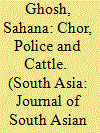

|
|
|
|
|
| Summary/Abstract |
India’s border with Bangladesh figures in the Indian national imagination as a unifying construct for multiple anxieties from illegal immigration to cattle smuggling, thus garnering public support for increased border security. What does a view from the lived and messy realities of the borderlands offer when we shift our focus from the fetish of the borderline as a political and religious marker of difference? This essay tracks the binary of legal–illegal through which cattle in the borderlands are framed, showing how bovines move across different terrains of the agrarian, the sacrificial and everyday cross-border trade in the borderlands and so resist this binary.
|
|
|
|
|
|
|
|
|
|
|
|
|
|
|
|
| 3 |
ID:
185110
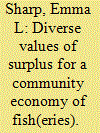

|
|
|
|
|
| Summary/Abstract |
This paper develops a diverse economies account of fish ‘waste’ that revalues it as ‘surplus’. We examine ‘Kai Ika’, a community marine conservation experiment in Tāmaki Makaurau (Auckland), Aotearoa New Zealand. Kai Ika rescues fish heads, frames and offal that were previously ‘going to waste’ and redistributes them to fish eaters who would otherwise struggle to access these foods. It involves fishers and community sector and Indigenous actors in an initiative that converts would-be waste into surplus. We examine the case as a diverse economic project that nourishes humans, enhances respect for fish as living beings, and potentially conserves marine resources in the face of global-to-local fisheries depletion. The research is based on community-gathered fish parts collection data, and virtual and email interview data. We analyse this data to produce an account of diverse ‘object values’ and fish-related surpluses that derive from surplus labour and other socio-cultural and environmental surplus. We argue that reframing fish economies in this way encourages new and diverse economic subjectivities and a more connected, relational and cooperative community economy of fish.
|
|
|
|
|
|
|
|
|
|
|
|
|
|
|
|
| 4 |
ID:
144860
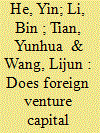

|
|
|
|
|
| Summary/Abstract |
This paper uses all 1404 initial public offerings (IPO) undertaken between 2002 and 2012 in China to analyze whether venture capital (VC) investment, especially foreign VC investment, brings more or less value-added services to the invested companies during the 3 years following the IPO. The results show that venture capitalists choose to invest in companies with higher value potential, and, in turn, the value of the companies increases after the IPO is undertaken; foreign VC adds more value to companies than domestic venture capital. However, the profitability of VC-backed and non VC-backed companies after IPO does not differ significantly. Nevertheless, it is shown that VC plays an active role in China.
|
|
|
|
|
|
|
|
|
|
|
|
|
|
|
|
| 5 |
ID:
028447


|
|
|
|
|
| Publication |
Home wood,, Richard D. Irwin Inc., 1970.
|
| Description |
ix, 293 p.
|
|
|
|
|
|
|
|
|
|
|
|
Copies: C:1/I:0,R:0,Q:0
Circulation
| Accession# | Call# | Current Location | Status | Policy | Location |
| 006905 | 338.521/FER 006905 | Main | On Shelf | General | |
|
|
|
|
| 6 |
ID:
083741
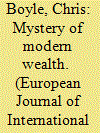

|
|
|
|
|
| Publication |
2008.
|
| Summary/Abstract |
Taking its cue from Jacob Viner's classic essay `Power versus Plenty', this article explores the social foundations of one of International Relations' basic analytic categories: `wealth'. An examination of changing notions of economic value in the early-modern period suggests that Viner's assessment of the unenlightened attitudes of mercantilist statesmen needs revision. The rise of a liberal world order presupposes not just a clearer understanding of the nature of value, and how best to obtain it, but a fundamental transformation in the character of value itself - from an attribute of metallic money alone, to an abstract economic property of all human labour. In accounting for this shift we reveal an underlying structure of social relations whose development lies at the root of both our modern notion of value and of the liberal international economy itself.
|
|
|
|
|
|
|
|
|
|
|
|
|
|
|
|
| 7 |
ID:
173994
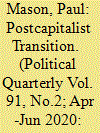

|
|
|
|
|
| Summary/Abstract |
The postcapitalism thesis asserts that open source and collaborative non‐profit organisations represent a new, non‐market sector in which the profit motive and monetary exchange no longer drive economic activity; in Marxist political economy terms, they are a new means for suppressing the law of value. Information technology has produced four systemic dysfunctions, limiting capitalism’s ability to function as a complex adaptive system: the zero marginal cost effect, the tendency to delink work from wages, positive network effects, and information asymmetries. In response, in addition to the traditional remedies of social democracy for a stagnant neoliberal economic model, left parties must adopt a programme of transition: aggressively breaking up technological monopolies; promoting universal basic income and basic service solutions; outlawing rent‐seeking business models; and promoting data democracy.
|
|
|
|
|
|
|
|
|
|
|
|
|
|
|
|
| 8 |
ID:
192179
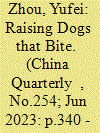

|
|
|
|
|
| Summary/Abstract |
Tibetan pastoralists have long been using dogs as guards. Since the late 1980s, the same dogs, called “Tibetan Mastiffs,” have become valuable pets for Han Chinese consumers. This paper discusses how commodification transforms the value of these dogs, and the care relationship between humans and dogs. Tibetan pastoralists and dogs participate in a reciprocal yet distanced care relationship through raising and guarding, which is not confined to a pursuit of dogs’ ferocity. In contrast, a taste for ferocity prevails in the Tibetan Mastiff market, and breeders care for dogs in a more dedicated, and yet more unilateral and dangerous, way. The unintended consequence of breeders’ care is that they raise dogs that sometimes bite; this is explained based on a process of value transformation in dogs’ guarding abilities, from ethical virtue to commercial price.
|
|
|
|
|
|
|
|
|
|
|
|
|
|
|
|
| 9 |
ID:
186430
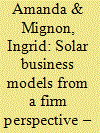

|
|
|
|
|
| Summary/Abstract |
A worldwide transition towards sustainable energy systems requires the diffusion of renewable electricity technologies. To achieve this, recent research has put emphasis on the role of business models as catalysts for sustainability transitions, particularly in the case of solar photovoltaics. Authors have identified a variety of solar business models that can be characterized based on roles, activities, and applications. In contrast, on the market, solar firms use business models to communicate their offer to clients, focusing on customers’ needs, how they organize their resources and activities to meet these needs and, in return, create value for themselves. The aim of this paper is to bridge the gap between the way energy policy literature describes solar business models, and the way solar firms use them to communicate with their clients. The business models of 241 solar firms in Sweden were mapped and analyzed using a framework developed by Richardson (2008) as well as the roles, activities, and applications as highlighted in solar business model literature. This led us to identify six types of solar business models. We found that there are some gaps and overlaps between theoretical and empirical solar business models which, in turn, have implications for theory and policy.
|
|
|
|
|
|
|
|
|
|
|
|
|
|
|
|
| 10 |
ID:
110422


|
|
|
|
|
| Publication |
2011.
|
| Summary/Abstract |
This article identifies the combined value that solar electric power plants deliver to utilities' rate payers and society's tax payers. Benefits that are relevant to utilities and their rate payers include traditional, measures of energy and capacity. Benefits that are tangible to tax payers include environmental, fuel price mitigation, outage risk protection, and long-term economic growth components. Results for the state of New York suggest that solar electric installations deliver between 15 and 40 ¢/kWh to ratepayers and tax payers. These results provide economic justification for the existence of payment structures (often referred to as incentives) that transfer value from those who benefit from solar electric generation to those who invest in solar electric generation.
|
|
|
|
|
|
|
|
|
|
|
|
|
|
|
|
| 11 |
ID:
091886


|
|
|
|
|
| Publication |
2009.
|
| Summary/Abstract |
In this article, I explore the relationship between 'value' and 'security' in the conceptualization of European construction and its transformation in recent years through the anti-terror effort. I suggest that the landscape of human values, and the way it is correlated with security, is discontinuous and fragmented. In the post-Madrid/London era, variations in cultures of law enforcement, border control, intelligence and diplomacy, and, not least, new cultures of fear and prudence, render this landscape increasingly complex. The value-laden nature of security and insecurity has contributed to a fragmented evolution in European approaches to the challenge of security. The politics of harmonization and standardization of European security reveals not a singularity in security, but the contrary, namely multiple securities. I thus develop a counter-argument to both realist and social constructivist understandings of values and the role these play in security thinking. I affirm, in a typical constructivist vein, that values matter in the formation of security policy. However, I reverse the typical constructivist position that sees security as the embodiment of ideas, arguing instead that the European self-understanding is itself the product of its own constellation of security and insecurity.
|
|
|
|
|
|
|
|
|
|
|
|
|
|
|
|
| 12 |
ID:
193473
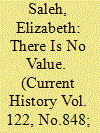

|
|
|
|
|
| Summary/Abstract |
This article draws on narratives from middle-class households in Beirut to examine their disenfranchisement amid the country’s financial collapse. A common expression, “There is no value,” is often used in allusion to extreme price fluctuation that has punctuated everyday life since the end of 2019. The phrase also speaks to the undoing of a middle-class lifestyle that emerged with the pegging of the Lebanese lira to the US dollar in the 1990s. Reflecting on how value is conceptualized at the level of the everyday leads into exploring some of the complex ways in which this middle-class milieu accessed credit following Lebanon’s civil war, and how everything has changed during the current dollar shortage.
|
|
|
|
|
|
|
|
|
|
|
|
|
|
|
|
| 13 |
ID:
027640


|
|
|
|
|
| Publication |
New Jersey, Prentice Hall, Inc., 1970.
|
| Description |
192pHbk
|
| Standard Number |
0-13-940163-6
|
|
|
|
|
|
|
|
|
|
|
|
Copies: C:1/I:0,R:0,Q:0
Circulation
| Accession# | Call# | Current Location | Status | Policy | Location |
| 008085 | 658.15/VAL 008085 | Main | On Shelf | General | |
|
|
|
|
| 14 |
ID:
041137


|
|
|
|
|
| Publication |
Massachusetts, Addison Wesley Publishing Company, 1971.
|
| Description |
vii, 232p.Hbk
|
|
|
|
|
|
|
|
|
|
|
|
Copies: C:1/I:0,R:0,Q:0
Circulation
| Accession# | Call# | Current Location | Status | Policy | Location |
| 008126 | 658.013/HEL 008126 | Main | On Shelf | General | |
|
|
|
|
| 15 |
ID:
148871


|
|
|
|
|
| Summary/Abstract |
I wish to argue that man is essentially a value concept; ipso facto
society and state. Consequently, no discussion and no talk about man
and society is complete without reference to value. Seeing in this light
the dichotomy of value and fact is not sustainable. In other words, any
discussion on man, society and state is bound to be value centric
|
|
|
|
|
|
|
|
|
|
|
|
|
|
|
|
|
|
|
|
|